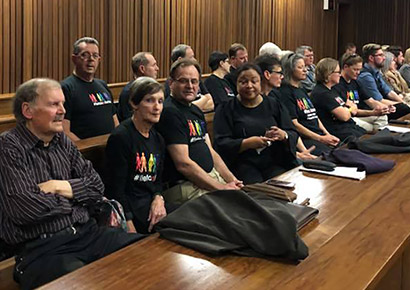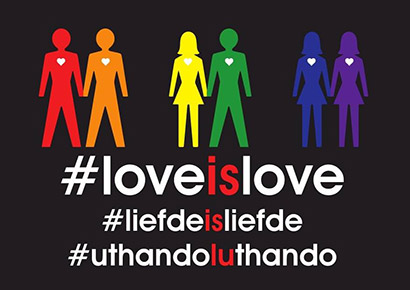Dutch Reformed Church “using freedom of religion” to discriminate against LGBT people

LGBT supporters at the High Court (Pic: Ecclesia De Lange)
The Pretoria High Court has heard that a decision by the Dutch Reformed Church (DRC) to no longer recognise same-sex marriages was not only unprocedural but also unconstitutional.
Eleven members of the church have taken it to court after, in November 2016, it reversed a groundbreaking October 2015 decision to allow individual church councils to bless same-sex relationships, and to drop a prohibition on non-celibate gay clergy.
It’s been claimed that the reversal followed a conservative backlash that led church leaders to kowtow to the most puritanical and homophobic elements of the DRC. The applicants, who are being supported by the Commission for Gender Equality, also say that the decision was procedurally flawed, according the church’s own rules.
On Tuesday, the applicants and their supporters attended the historic court hearing wearing black t-shirts emblazoned with rainbow coloured figures and the slogan “#loveislove”; in English, Afrikaans and Nguni.
The church has insisted that as a religious institution it is protected by religious freedom and has the right to make its own rules and follow its own doctrine. Advocate Schalk Burger also argued that the church’s decision was not in breach of the Constitution, because, while it might be discriminatory, it was not “unfair discrimination”.
Representing the applicants, Advocate Jeremy Gauntlet said that the church could not have different rules for different people, based on their race, gender or sexual orientation. “If celibacy is the virtue of morality, then they would tell everyone in the church to be celibate,” he said as an example.
In a post on Facebook, Prof. André Bartlett, one of the leading proponents of LGBT equality in the DRC, commented: “Low point in today’s court proceedings: that the DRC’s advocate admits that the 2016 decision is discriminating against against gay members and then trying to explain that it is fair discrimination.”
Judgment has been reserved and a decision is expected to be handed down before the end of the year. The Reverend Laurie Gaum, one of the primary applicants, told Mambaonline that he was satisfied with Tuesday’s hearing.
“It was a positive experience. It sounded like we had a fair hearing and there was a lot of understanding from the judges, asking deeper into the case,” he said. “Procedurally and constitutionally, I think we have a very strong case and we are obviously hoping for a good outcome.”
Conservative religious groups, such as Freedom of Religion South Africa, have warned supporters that the case “could potentially have dire implications for the autonomy of the church – and indeed the broader religious community – in South Africa.”
Gaum responded that the intention was not necessarily to force churches to officiate same-sex marriages but to give individuals and communities within the church the freedom to choose to do so for themselves.
“It [would] just open up space for choice for individuals and also pastors to decide on whether or not they want to marry within their churches or if pastors want to unionise same-sex marriages,” he said. Gaum pointed out that the original 2015 DRC decision did not force all its ministers to accept marriage equality but simply allowed those who wished to marry same-sex couples the option to do so.
 “We’re saying a blanket ‘no’ within the church to marry same-sex couples is an absolute ‘no’,” he explained. Gaum believes that churches must stop using freedom of religion as an excuse to opt out of their constitutional obligations.
“We’re saying a blanket ‘no’ within the church to marry same-sex couples is an absolute ‘no’,” he explained. Gaum believes that churches must stop using freedom of religion as an excuse to opt out of their constitutional obligations.
“Churches also obviously need to adhere to the Constitution. The non-discrimination clause is in the Constitution and it is specified in relation to race, gender and sexual orientation. They seem to be hiding behind freedom of religion and think they can do anything by just claiming that right, which is highly problematic,” Gaum said.
“As far as I am concerned, my theology demands that churches should not be discriminatory. They definitely need to apply their minds to what it means to be non-discriminatory on many levels, including their members as well,” he added.
- Facebook Messenger
- Total251
Leave a Reply